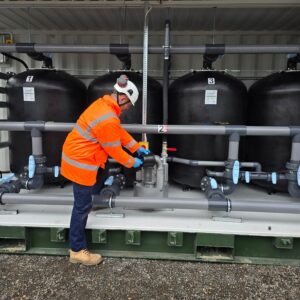Phosphorus Removal Options Explored in Collaborative Trials

Lisa Mansell, chief engineer (innovation and carbon) at United Utilities (Image source: Spring Innovation)
The water industry is heavily dependent on the use of metal-based coagulants for the removal of phosphorus, particularly at rural wastewater treatment plants. By exploring the key benefits, such as cost, reliability and sustainability, ALT-P aims to reduce the carbon footprint of wastewater treatment and increase resilience by reducing reliance on chemicals.
The alternatives being examined are:
- Electrocoagulation and natural coagulation – onsite investigations led by United Utilities at Woolton Wastewater Treatment Works are complete and technical reporting is underway.
- Reactive media - investigations led by Southern Water and the University of Portsmouth are due to complete in October 2024.
In the coming months, the ALT-P team will be discussing the project at upcoming sector events:
- European Wastewater Management Conference, in Manchester, UK, on 2-3 July 2024.
- ALT-P conference hosted by United Utilities at Haweswater Conference Centre, Lingley Mere, Warrington, on 17 September 2024.
Spring will also host a project knowledge showcase event and three surgery sessions, as part of its best practice knowledge-sharing initiative. More details will be released soon.
Lisa Mansell, chief engineer (innovation and carbon) at United Utilities, said: “Through the ALT-P project, we aim to determine what can be achieved using alternative approaches and the climate benefits these could deliver for the water sector.
“The project is really opening up new opportunities and we are now understanding, in more detail, what is required from us as water companies to incorporate these processes and move away from our fossil fuel-based standard solutions.”
Phosphorus can enter watercourses from various sources, including wastewater treatment works, agricultural land and urban run-off. High levels are damaging to water environments, promoting excessive algal growth and depriving fish and other aquatic animals of oxygen.
In England, excess phosphorous remains the top reason for water bodies failing to achieve ‘good’ ecological status, and water companies are working to achieve ever-tightening targets for its removal from wastewater.
Chloe Tooth, knowledge and communications manager at Spring said: “Spring is delighted to be the knowledge-sharing partner on this collaborative project to find alternative approaches to phosphorus removal at rural wastewater treatment works.
“We are extremely proud of how our knowledge transfer service is helping to disseminate knowledge from these innovation projects and accelerate learning across the sector.”
Source: Spring Innovation







